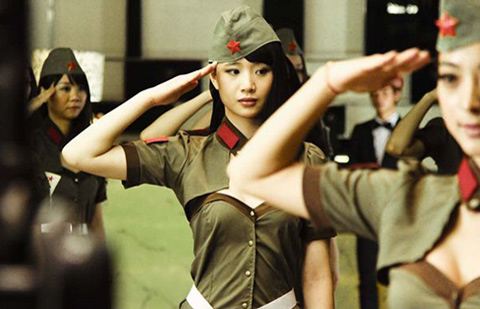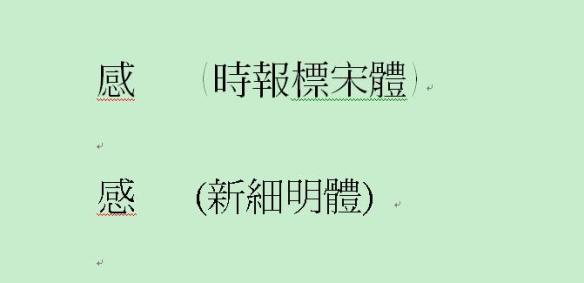In a phrase: A pantomime until the end, at which point it rushes to satisfy nationalistic appetites.
(Spoilers below)
This film is set in a small Chinese town called Guajia (hang up armor) under Japanese occupation during the second world war. Two prisoners are mysteriously delivered to Ma Dasan, a man who lives in the village, at knifepoint by a stranger who does not reveal his face. Ma Dasan is told to hold on to the two prisoners, a Japanese soldier and a Chinese translator, until “they” come for them and to make sure they don’t escape or die, or Ma Dasan, played by Jiang Wen, will be killed. Slapstick comedy ensues as Japanese soldiers come into the village several times and very nearly discover the prisoners, Ma Dasan is picked by the villagers to kill the two prisoners, but can’t do it so the village sends to the nearest town to hire a professional killer who also fails to carry out the task. All the while the villagers have built up somewhat of a rapport with the Japanese prisoner through the translator, who deliberately mistranslates between the two according to his own best interests. I found these slapstick elements and the “comic” mistranslations all a bit trite and pantomime-like.
The film goes some way to humanizing the Japanese soldier in captivity, as we learn that he is just a farmer like the villagers in Guajia. The slapstick comedy in the film is also divided between Japanese soldiers and the Chinese peasants – with the same actors used to play two hapless Japanese soldiers as play two of the main villagers. The resulting idea that comes across is that these are simply bumpkins playing at war – which is possibly the closest the film comes to a nuanced view of war.
When the villagers draw up a contract with the prisoner, stating that they will return him to his unit in exchange for food for the village, we are presented with the “baddy” of the piece – the unit commander, who is the incarnation of the Chinese (and Western) impression of Japan’s wartime ideology. In a climactic scene in which the unit commander “reveals his true colors” the whole village is slain and burned to the ground while Ma Dasan is fetching his wife Yuer from her mother’s house to get their share of the reward for returning the soldier. While the scenes are not quite as graphic as the bayoneted fetus in Black Sun: The Nanking Massacre, there is the murder of the elderly village head, a woman and a young boy and the human side to the Japanese soldier in the village we saw before disappears. The cherry on the cake is when the unit commander stops the Japanese soldier who was taken prisoner from committing seppuku by announcing that he has already received notice that the war was over, but had let his soldiers perpetrate this massacre before telling them. This seemed to be an attempt to fan the flames of Chinese anti-Japanese sentiment and lacked the breadth of nuance of films like The Railway Man which tries to contrast war mentality with post-war mentality, or like the Human Condition (《人間の条件》) film trilogy. In the Railway Man, a man confronts the Japanese translator that was party to his torture long after the war is over and they eventually come to be friends. Human Condition on the other hand documents one man’s journey from enthusiasm and seeing the colonial project as a humane civilizing mission which has been tainted by violent and corrupt officers on the ground to a realization that the problem is with the entire idea of colonialism itself (see more here).
I didn’t feel that this film achieved its goal in this sense, given that this is what Jiang has stated he was aiming to achieve. There are hints that it was trying to, however, for example, as the villagers of Guajia are being killed, there is a broadcast from the Emperor of Japan, announcing Japan’s decision to lay down arms and making reference to the atom bombs dropped on Hiroshima and Nagasaki.
Another interesting aspect of the film was the portrayal of the Kuomintang (KMT) or Nationalist army. Ma Dasan returns to the local city where the Japanese soldiers are being held in detention after the war and he goes on a rampage with an axe, killing many prisoners. The KMT leader then makes an impassioned speech about how much he too has suffered and compares this to the suffering of Japanese people themselves. When Ma Dasan is executed by Japanese troops on order of the KMT he honks like a donkey when asked for final words. This denouement sets the stage for the Communist takeover of China – as the Kuomintang are seen to be simply pawns of the Allied Forces and overly friendly to the Japanese. That the film portrays the KMT in government during the victory over Japan (albeit as puppets of the allies) and the lack of overt anti-Japanese sentiment among the villagers, who are also portrayed for the most part as ignorant bumpkins, may be why the film was banned.
Overall this film is watchable in the same gung-ho way as many older Western movies on German prisoner of war camps. There is no deeper level of analysis here and it is a bit of a crowd-pleaser.
Score: 2.5/5
I found this Chinese language review from a mainland Chinese viewer online: http://i.mtime.com/liyang5201314/blog/2762633/










